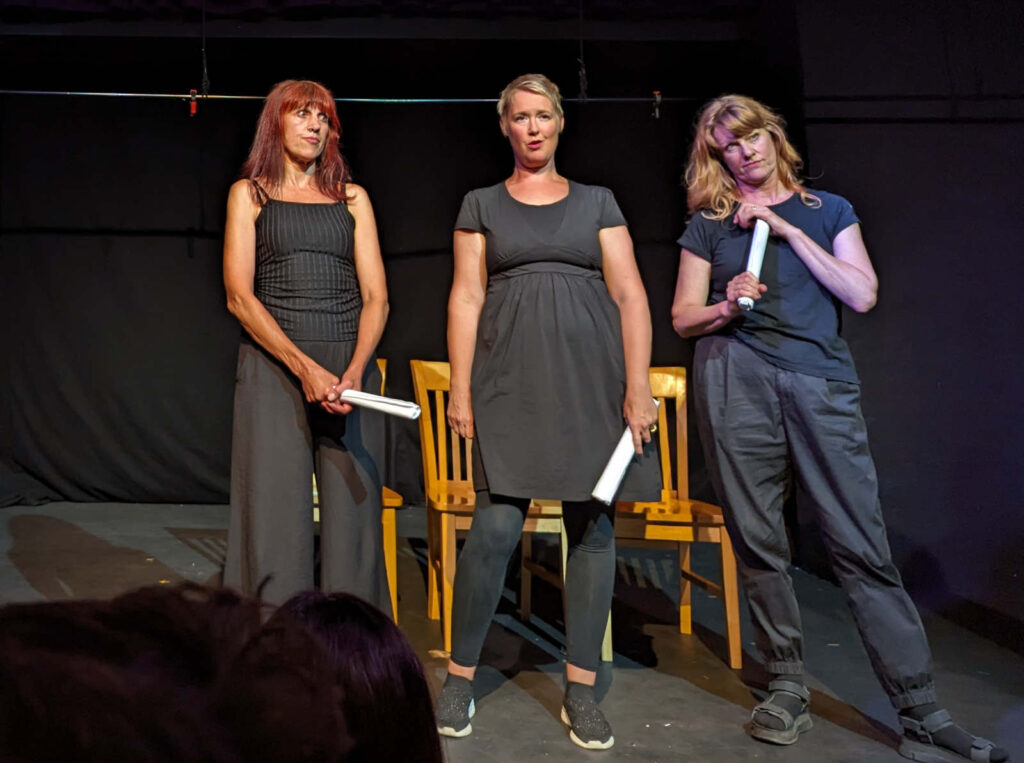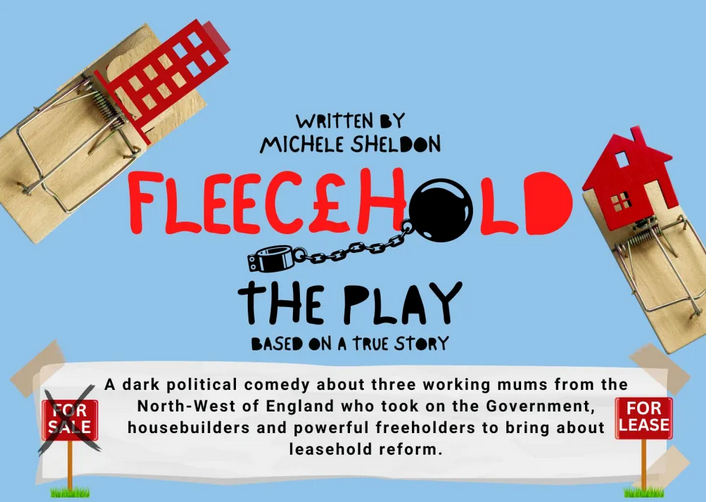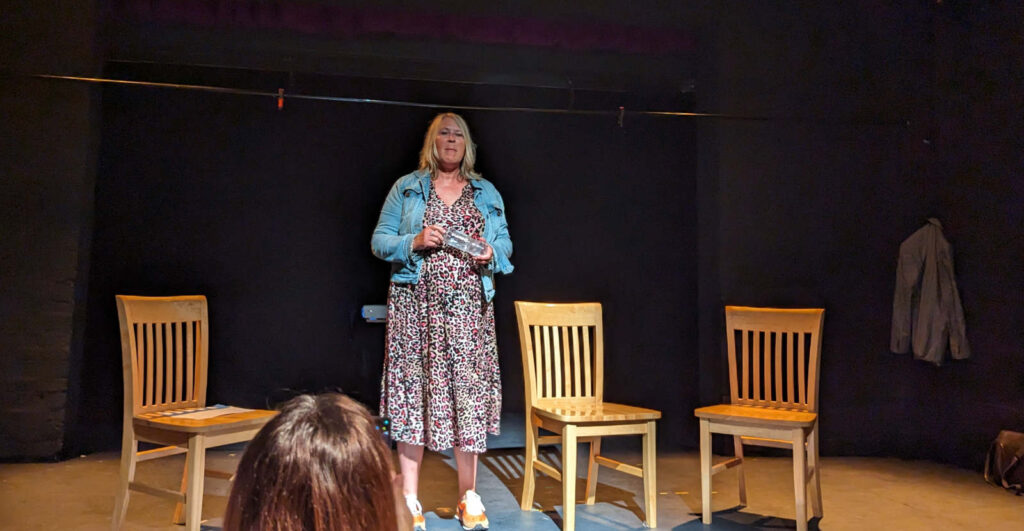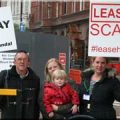
The story of the three women who founded the National Leasehold Campaign has been turned into a play that was performed in London over the weekend.
“Fleecehold” tells how Katie Kendrick, 43, Cath Williams, 66, and Joanne Darbyshire, 53, founded the mass movement, which has staged demonstrations across the country – including two outside the Houses of Parliament – that has helped change the leasehold system – albeit with much still to be done.
Pressure brought by the National Leasehold Campaign managed to shame into oblivion developers spreading the scourge of leasehold houses across the country, highlighted the disaster of aggressive ground rents and exposed numerous dodgy income streams squirreled into leases, such as paying for permission to change your carpet or door-bell or keep a cat.
All three performances at the Little Angel Theatre in Islington were a sell-out, doubtless helped by an article in The Sunday Times by veteran leasehold reporter Martina Lees the week before:
Meet the three women fighting England’s leasehold laws
Meet the three women who took on some of the oldest laws in the land – and whose story has now been made into an inspiring play
Saturday night was attended by Lord (Roy) Kennedy, Labour chief whip in the Lords, his wife Alicia, who also sits in the Lords for Labour as Baroness Kennedy, Susan Bright, professor of land law at Oxford University, Martin Boyd and Sebastian O’Kelly, of LKP, Liam Spender, solicitor and leasehold campaigner, and an audience of around 80 appreciative leaseholders, including long standing activists in the sector.
There was even the head of legal for Pier management, doubtless there to report back on the play’s unwelcome message to his employers (Peter Edward Gould and Nicholas Charles Gould, who own the Regis group).

After the performance, Katie, Cath and Joanne took to the stage for a Q&A session with the audience.
The play was a remarkably accomplished piece of work by writer Michele Sheldon, carried out in part as a lockdown project. She was well served by a cast of three women and three men, who had to deliver complex lines explaining the flaws and revenue potential in residential leases – which is not obviously dramatic material.
“Who would have thought it was possible to produce a play about a subject as boring as leasehold?” said Katie Kendrick, paying fulsome praise to Michelle and the cast.
The NLC founders were represented by actors Lucille Ferguson, playing Katie Kendrick, Cath Burton as Cath Williams and Sarah Ravencroft as Joanne Darbyshire.
The male actors – Philip Honeywell, Rowland Hill and Tim Knightly – played an assortment of loathsome figures, from craven, developer-recommended solicitors dumping their “clients” into disadvantageous leases – “they are virtually freehold” – monetising spivs among the housebuilders dreaming up leasehold income streams and hugely rich and entitled freehold owners, who buy up the freeholds and milk them.

Two male characters in the play to be sympathetically portrayed were Sebastian O’Kelly, of LKP, and Louie Burns, an enfranchisement practitioner and brilliant campaigner who held meetings for leaseholders around the country. Louie, who was also an LKP trustee, died in June 2020 aged 54, so it was moving to see him recalled to life in the play, complete with his talismanic shoulder satchel.
A scene where the housebuilders sales team cobble together permission fees to rip off their own customers – assisted in these disastrous purchases by taxpayers’ money – was brilliantly well done and the comic highpoint.
From what one hears from sources among the housebuilders, this section might as well have been documentary reportage of how leasehold incomes were racked up to impossible levels by some of their dodgier colleagues. The scamps responsible have long since been moved on.
Landlords here were depicted in broad-brushstrokes, playing on the entrenched privileges of grotesquely entitled aristocrats.
As it happens, gameplayers in the leasehold sector do include some rather posh individuals – perhaps the business model is easily comprehensible – but there are plenty of others, too.
It is a sad truth that the leasehold game in England and Wales – with its legally enforceable income streams – has attracted investors who are some of the richest people on the planet. Of course, most are carefully hidden and often based offshore, but they are the anonymous owners of assets in funds such as those run by Long Harbour, Wallace Estates and E&J Estates and similar.
Another aspect – not explored in the play – is how the British public, or at least the property owners in it, became complicit in the seemingly endless ramping up of residential property values over the past 25 years (which I was deprecating as a journalist from around 2002).
Somehow or other we turned boring old British houses into a worldwide investment asset, and the result is misery for younger generations – as well as utterly pointless, wasted investment that should be going into productive areas of the economy.
The leasehold system, as the play made clear, is a perfect means by which the already propertied become more affluent at the expense of the disempowered. Other countries look at this arrangement with astonishment, as was expressed by foreign nationals in the audience.






 Call for evidence on shared ownership, from the robust Communities Select Committee
Call for evidence on shared ownership, from the robust Communities Select Committee






















With Labour backtracking it seems on e again mo chance of anything being done .
As far as we are aware nobody has backtracked. The government did not remove leasehold and commonhold reforms from the Queens speech as some people have claimed its there on page 69 of the notes to the speech. Labour have also not backtracked and neither have the LibDems.
All of main parties are committed to major reform which will bring forward the systems to start the end of leasehold.
Unfortunately housing reform is complex and too often gets left behind because most governments spend most of their time fire fighting. Few would argue the 2002 reforms did worked well. Both bills were delayed due to other priorities meaning that two bits of legislation got squashed together at the last minute so instead of there being the 2002 leasehold reform act and the 2002 commonhold reform act we had the chimera Commonhold and Leasehold Reform Act written by lawyers and in two different departments based on policy developed by two sets of officials with commonhold not even seen as a housing issue just a matter of land tenure policy. As a result we ended up with commonhold not being properly promoted or developed because it sat under the Justice rather than Housing Department.
Overall, things are looking up and seem promising at last for the often exploited, down trodden and mostly ignored Leaseholder.
Overall, things are looking up and seem promising at last for the often exploited, down trodden and mostly ignored Leaseholder.
The problem of land ownership dates back to 1066 and this is a huge issue which means that the aristocracy keeps the land and it never belongs to those who have bought leases.
This does not happen in other countries. Look at France.
If you challenge the leasehold system you challenge the hegemony of the Enlgish ruling class and monarchy.
That is why change is resisted.
Doesn’t this need a huge public campaign to alert the population.? We need to abolish the feudal lease system. Does any politician dare say this?
There is no Constitution here. All is laissez-faire and we, the public, have been hoodwinked into thinking that leases give us ownership. They do not.
Spot on comment.
You have encapsulated exactly why all of this well-meaning, and upright citizen politicised activity is never going bear any fruit, or change anything.
Only extremely radical action will address the inherent unfairness and system perpetuating legislation in place to unshackle leaseholders, or do away with the oppressive leasehold
concept altogether. But it will take far moer than a handful of do-gooders landing the odd glancing blow ( so easily deflected) to the people who run this country. The fight needs to awaken and be taken to every leaseholder in the country.
Indeed. The people have no idea who owns the land or even why they have to have a lease.
This information is not part of public knowledge and it is as important as the other huge issues which take media space.
Action is needed to favour land equality.
Of course the French did it in 1789.
Please read the comment of Martin above. Leaseholders, led by LKP and the National Leasehold Campaign. have already dealt a blow to this archaic feudal system.
The Law Commission, appointed in 2017, delivered its recommendations in 2021. These recommendations, in relation to new leases, have already been enacted in law. And Michael Gove is scheduled to announce changes for existing leaseholders in the forthcoming King’s Speech.
Certainly there are backsliders (who in most cases appear to have conflicts of interest) but they are now seriously outnumbered and, with solid all party agreement, this current parliament will ring in the changes for existing leaseholders.
And when that is done, Commonhold can follow.
Alec,
A lot has already been achieved and I hope there is much more to come, I will watch the Kings speech on the 7th November and listen intently to what is said.
More has been achieved in the past few Years than in previous Decades, yet the abolition of the archaic feudal Freehold / Leasehold racket does not appear to be quite insight yet, but I hope for major reforms to be announced that will lead to the end of the above.
The sooner Commonhold is available for those that wish to adopt it the better.
Does anyone know why Park Home Residents are being left out in the cold, when it comes to the various reforms of housing, etc, ?
Stephen
The last Government advice for Park Home Residents appears to be in a Document titled Advice for Park Home Owners dated June 2013.
It’s time it got updated.